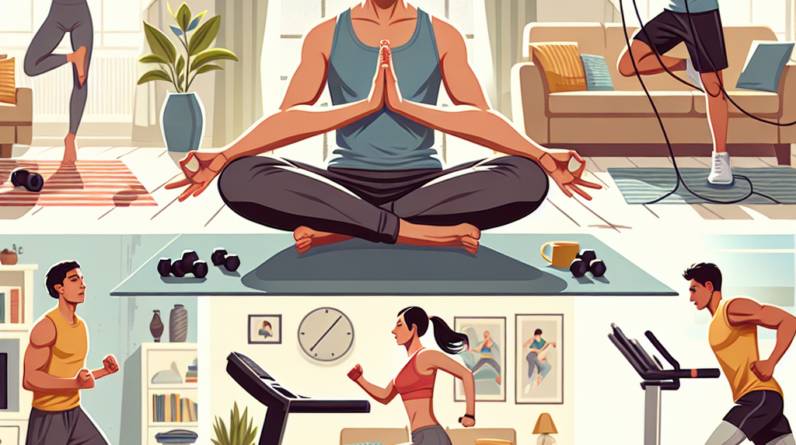
Meditation and Mindfulness Practices
Understanding the Basics of Meditation
Let me tell you, meditation was a game-changer for me. I remember the first time I tried it; I was skeptical. I mean, how could just sitting there do anything? But when I dove into it, I realized meditation isn’t just about silence. It’s a practice that allows our minds to take a much-needed break from the chaos surrounding us.
Get a Huge Discount and Bonus! Try for 90 Days Risk Free
At its core, meditation is about focus and awareness. You can start small, just a few minutes a day. As you practice, you’ll learn to focus on your breathing, sensations in your body, and even the sounds around you. It’s like a mini-vacation for your brain! Remember, there’s no right or wrong way to meditate—just find a style that resonates with you.
With consistent practice, I found my stress levels dipping significantly. I felt more present, calm, and surprisingly, more productive. It became a tool I reached for during those overwhelming days at work or simply when life felt too hectic.
Mindfulness in Daily Activities
Mindfulness isn’t just about sitting on a cushion—it’s about bringing awareness into your everyday life. I started applying mindfulness techniques during routine activities. Cooking became a joint meditation of sorts; I focused on the textures, colors, and smells of the food. It transformed my perspective, turning an everyday task into a joyful experience.
You can practice mindfulness during walks, social interactions, or even while sipping your morning coffee. I encouraged my friends to do the same and they found it refreshing, like a breath of fresh air in their busy lives. It’s amazing how being fully present in the moment can shift your mindset and reduce stress.
As you cultivate mindfulness, remember it’s about embracing each experience without judgment. When challenges arise, reflect back on these moments of presence, and you’ll see them in a different light, allowing the stress to melt away.
Guided Meditations
Now, I’m a huge fan of guided meditations—especially for beginners. There’s something comforting about having someone lead you through the process. YouTube and various apps offer a treasure trove of sessions aimed at different needs and durations. I usually put on some headphones, find a cozy spot, and let the guide take me on a journey.
These sessions often combine aspects of visualization with deep relaxation techniques, and I must say, they can transport you to a wonderfully serene place. I’ve experienced meditations focused on stress-relief, better sleep, and even gaining clarity on specific issues in my life. It’s like having a personal coach in your pocket!
Over time, I built up a toolkit of favorite guided sessions, and whenever I feel stress creeping in, I return to them. The best part? It’s easy to access these resources anytime you need a boost or a moment of peace.
Get a Huge Discount and Bonus! Try for 90 Days Risk Free
Nourishing Your Body with Whole Foods
The Impact of Diet on Mental Health
Your diet plays a significant role in how you feel both physically and mentally. I learned this the hard way after countless late-night snacks and fast-food runs. Cutting processed foods out of my diet and focusing on whole, nutrient-rich options was like flipping a switch for my mood.
If you think about it, what we consume literally becomes part of us. Eating fresh fruits, vegetables, whole grains, and lean proteins provided my body with the fuel it needed to combat stress. Plus, there’s something incredibly satisfying about preparing a colorful plate of nourishing foods.
Over time, I noticed my energy levels increased, and my outlook on life got a refreshing boost. I started to feel more in control and empowered, which naturally led to less stress. Remember, it’s all connected!
Meal Prep for Stress-Free Eating
When life gets hectic, it’s easy to fall back into unhealthy eating patterns. That’s why I swear by meal prepping! Spending a couple of hours on the weekend to prepare healthy meals for the week saves me time and reduces the temptation to grab something quick and unhealthy.
Need a Serious Energy BOOST? Huge Discount Try for 90 Days Risk Free
I typically set aside time to cook up a batch of brown rice, roast some veggies, and grill chicken or tofu. Then, I portion everything into containers for quick and stress-free meals. It’s such a relief knowing I’ve got wholesome options ready to go, especially on those busy weekdays.
Plus, meal prepping can evolve into a fun social activity. I often invite friends over to prep together, share recipes, and explore new healthy dishes. It turns a chore into a bonding experience, which reduces stress even more!
Hydration and Its Importance
One thing I learned through my journey is how crucial hydration is for overall well-being. I used to underestimate the power of water—it sounds so simple, right? But staying adequately hydrated can lead to clearer thinking, improved mood, and less fatigue.
I keep a water bottle with me at all times to remind myself to sip regularly. I also try to incorporate herbal teas, especially calming ones like chamomile or peppermint, to my routine. There’s something about a warm cup that instantly takes the edge off. Plus, it’s a great ritual to wind down with.
So, if you’re feeling foggy or stressed, check in with your water intake. It might just be what you need to elevate your mood and energy levels. Cheers to that!
Physical Activity and Movement
The Stress-Relieving Benefits of Exercise
Let me start by saying exercise doesn’t have to mean hitting the gym for hours on end. I initially struggled with this but soon discovered that any form of movement can do wonders for stress relief. Whether it’s a brisk walk, dancing, or kicking it in my living room with some yoga, getting my body moving changed everything.
When we exercise, our bodies release endorphins—the feel-good hormones! I recall one particularly stressful week where I forced myself to go for a short run. Not only did I clear my mind, but I also felt way lighter afterward. It’s like I had shed some of that anxiety physically.
Pick something that you enjoy, and it won’t feel like a chore. Just remember, consistency is key. Even a little bit every day can have a big impact over time!
Good Health Solution is Easier Than Most People Think!
Take a Look for Yourself!
Incorporating Flexibility and Relaxation Techniques
Flexibility practices like yoga and stretching became my go-to stress relievers. They not only improved my physical flexibility but also my mental tranquility. I particularly love yoga sessions focused on relaxation, where we hold poses for longer, allowing our bodies and minds to truly release tension.
During one of my first yoga classes, I was amazed at how much stress I carried in my body. The instructor’s gentle reminders to breathe and let go helped me to reconnect with myself. I still use these techniques, especially when I’m facing high-pressure meetings or even when life feels heavy.
If yoga isn’t your thing, try simple stretches or deep breathing exercises. Set aside just a few minutes a day–you’ll be surprised at how transformative it can be!
Find an Activity You Love
The best part about reducing stress through movement is finding something you genuinely love. Whether it’s rock climbing, cycling, or joining a local dance class, explore your options! It’s essential to make it enjoyable rather than another task on your to-do list.
I discovered my love for hiking quite by accident. Being out in nature not only gets my heart rate up but allows me to disconnect from technology and just be. Nature has a way of grounding us and filling our cups with fresh energy.
So, get curious! Try out different activities until you find one that makes you feel alive, happy, and stress-free. It really makes a difference when you’re having fun while being active.
Connecting with Nature and the Universe
The Benefits of Time Outdoors
We’ve all heard it a million times: getting outside can do wonders for your mood, and let me tell you from experience—it’s true. Nature has this innate ability to soothe our minds. I encapsulate my weekends by spending time outdoors, whether it’s hiking, picnicking, or simply taking a walk in the park.
There’s something magical about the fresh air, the sounds of birds, and the feeling of grass under your feet. I often find that moving away from the hustle of city life into a natural setting allows my stresses to melt away. My worries feel small and manageable against the backdrop of vast trees and open skies.
Nature can also inspire fantastic moments of reflection and gratitude. I often take a moment during my outdoor adventures to breathe in deeply and appreciate where I am, both physically and mentally.
Grounding Techniques
Grounding is another concept that resonated with me—a technique where you connect with the earth beneath you. I often practice this by simply taking off my shoes and standing on grass or sand. It’s a beautiful way of reconnecting with nature when everyday life feels overwhelming.
It’s as simple as closing your eyes, focusing on the sensations in your feet, and visualizing your stress being released back into the earth. Many people who practice grounding report decreased anxiety levels and a more stable mood—so why not give it a shot?
Even a few minutes of this practice can make a world of difference, grounding yourself back into the present and helping you shake off the weight of stress.
Exploring Spirituality and Your Place in the Universe
Lastly, I didn’t fully appreciate the connection between spirituality and stress relief until I explored it myself. I began to question my own beliefs and understand my place in the universe. What brings you joy? What gives your life meaning? Asking yourself these questions prompts a deeper connection with yourself and your surroundings.
Whether through prayer, meditation, or simply reflecting under the stars, finding that spiritual connection helps for grounding oneself. I often found clarity in nature and had profound realizations during moments of stillness and observation.
Don’t hesitate to explore what spirituality means to you. It could be anything from organized religion to personal practices that inspire you. Connecting with something bigger than ourselves helps dissipate stress and reframe our perspectives on life.
FAQs
1. What is the best time to practice meditation or mindfulness?
The best time is whenever you can fit it into your schedule! Some prefer mornings to set a positive tone for the day, while others find evenings a great way to unwind. Find a time that works best for you and stick with it.
2. How often should I engage in physical activity to manage stress?
Even short bursts of activity—just 20 to 30 minutes a few times a week—can have significant benefits. Making movement a regular part of your routine is more important than how intense the workouts are.
3. Can diet really affect my stress levels?
Absolutely! Consuming a balanced diet rich in whole foods can enhance your mood and energy, while excess processed foods may lead to mood swings and increased stress levels.
4. Is grounding effective for everyone?
While grounding may work well for many, individual experiences vary. It’s certainly worth trying out to see how you feel! Spend some time in nature and see if it brings you peace.
5. How can I incorporate spirituality into my daily life?
Start small—set aside a few minutes each day for quiet reflection, prayer, or journaling about what matters to you. This can help you build a deeper connection with yourself and reduce stress.








